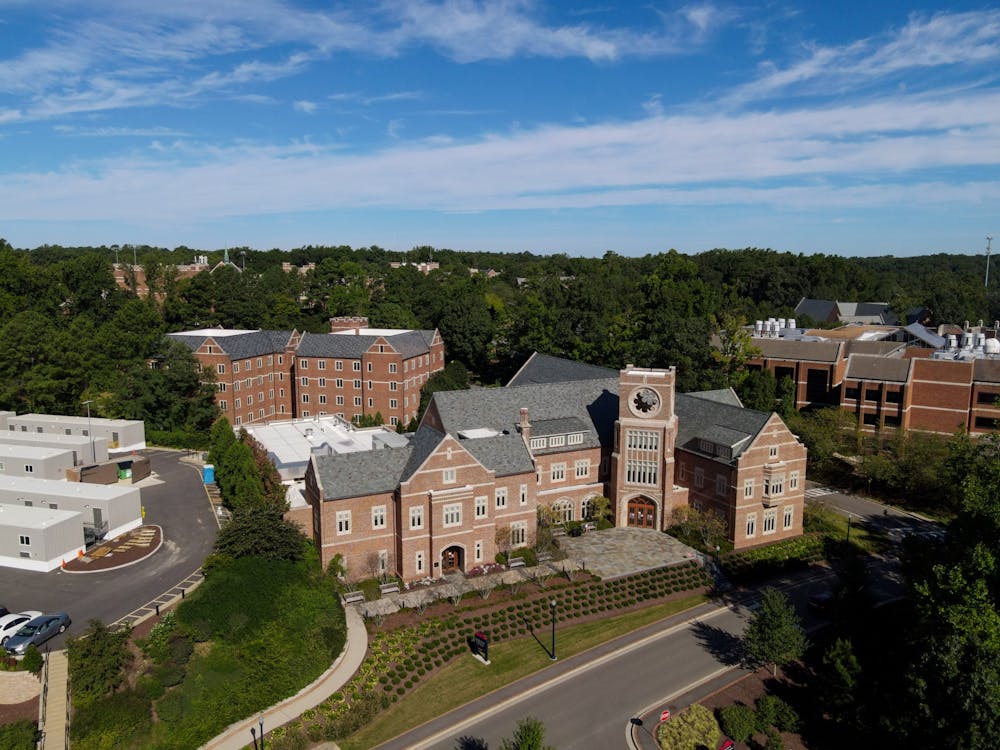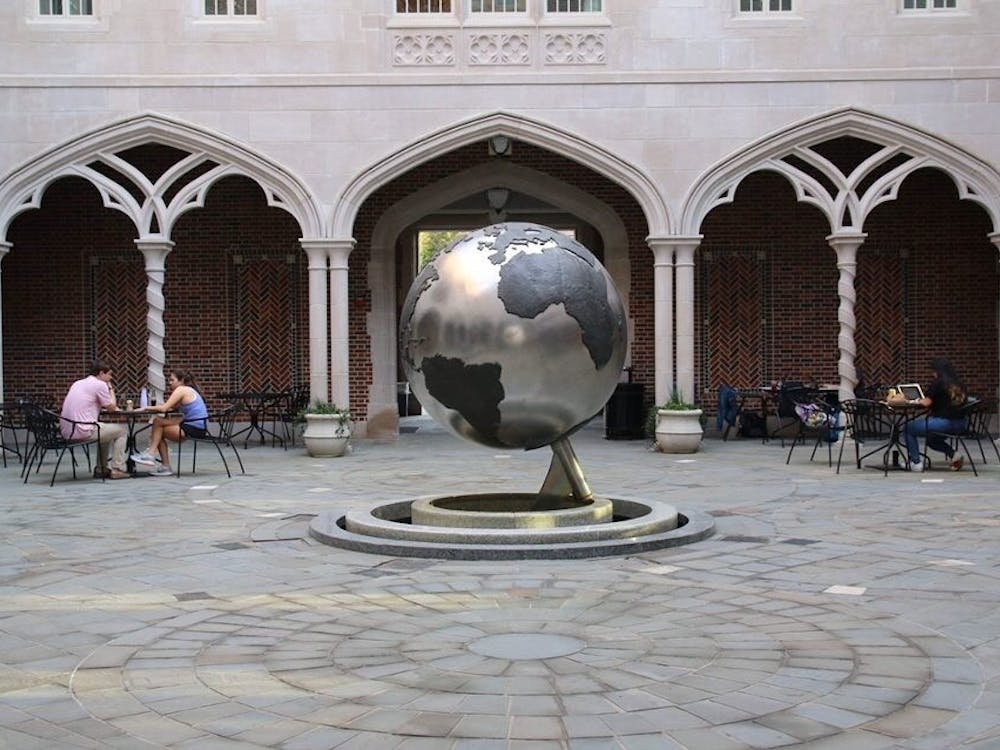Editor’s note: Kristen Starks is a Collegian editor.
The tension was palpable as Edward Ayers, former president of the University of Richmond and special adviser to the Naming Principles Commission, struggled to answer questions students asked at the commission’s listening session on Oct. 27 in the Alice Haynes room.
The number one question students posed at the hour-and-a-half long meeting: Where are the members of the Board of Trustees?
Following the Black Student Coalition’s protests in March demanding UR remove the names of Douglas Southall Freeman, a eugenicist, and Robert Ryland, an enslaver, from the buildings named after them, former UR President Ronald Crutcher and the Board created the Naming Principles Commission in May to design a framework for future decisions related to the names honored on campus.
This semester, the commission reached out to Richmond Student Government Association and Westhampton College Government Association through the deans to hold a listening session open to all community members, said RCSGA and WCGA presidents Anthony Lawrence, a senior, and Penny Hu, a junior. The pair said they wanted the meeting to serve as a forum to connect students with those in charge of making the decisions about naming buildings, programs, scholarships and more.
“I'm excited to just be in that space and have a constructive conversation with other students as well,” Lawrence said. “Get their consensus, get their ideas, because that's really what's important to the student government.”
However, that did not happen because none of the four Board members who are part of the commission -- Jeff Brown, Georgia Nugent, John Roush and Wendell Taylor -- attended the meeting. Hu said she had not been aware that Ayers; Ann Lloyd Breeden, vice president and secretary to the Board; and Professor Lauranett Lee, who has led the research about Freeman and Ryland, would be the only ones to attend on behalf of the trustees.
“We’re going to email [the Naming Principles Commission] right after this to see if there's any way to keep pushing them to have the naming commission actually come out and actually have a meeting with us and with students,“ Hu said.
Cynthia Price, associate vice president of media and public relations, wrote in a Nov. 2 email to The Collegian that not all members of the commission were able to attend the listening sessions.
“The input provided by all those participating in the listening sessions is deeply appreciated by the naming commission,” she wrote. “It represents a valuable contribution to the commission's ongoing work and future recommendations to the president and Board.”
When students expressed concerns about how their opinions would be relayed to the actual members of the commission and the Board, which will ultimately make renaming decisions, Ayers said he understood that the meeting might seem like it is delaying the demand to remove Freeman and Ryland’s name, but assured them that it was not.
“This is not a stall-tactic,” Ayers said. “Believe me, I wouldn't be involved if it were. It's actually designed to accelerate the process, because for decisions to be made about Ryland and Freeman the Board wants to defer to clear principles.”
Enjoy what you're reading?
Signup for our newsletter
Breeden projected a PowerPoint presentation with two guiding questions for the discussion:
- What is it that you want the Naming Principles Commission to know and to tell the Board regarding this issue?
- Do you have examples of principles you propose/would like to see adopted?
Breeden then typed what the students responded at the meeting in digital sticky notes displayed on the PowerPoint, which Ayers and Lee said would be shown to the commission. Hu and students like first-year Usra Karar felt that Breeden did not capture the essence of the students’ statements in the PowerPoint, adding that the method was simply not effective.
“I would read the sticky notes, and sometimes they didn't sound right compared to what the student said, so that kind of bothered me,” Karar said. “[Ayers] also seemed like he was in a rush towards the end, as if he just wanted to end it, so that kind of took me aback.”
Senior Meghna Melkote questioned the conflict of interest of the Board making decisions about renaming of buildings when the rector, Paul Queally - -who staff and students had called to resign, citing racist and homophobic remarks he has made -- is the namesake of several buildings on campus. The Queally Admissions Center’s name has already been called into question in 2014 after homophobic comments Queally made surfaced online.
Lawrence proposed that donations should not be taken into consideration in naming decisions.
“What did they do for this university that's not monetary?” Lawrence asked.
Senior William Bartnett disagreed, noting that implementing that measure would deter donors from continuing to give to UR.
“The value that people put on having a name on a building, whether that's respectable or not… draws a lot of donations,” he said, adding that money should not be the only factor in the decision to name a building after someone.
Others asked about the diversity of the Board, interested in learning how a predominantly white group could make a decision that affects students of color the most. Out of 25 members, including President Kevin Hallock, only three are not white -- Taylor, Mariana Lopez de Lara and Mihir Patel.
To many of the students at the listening session, the issue boiled down to the Board having to choose between the well-being of Black students or honoring those who actively participated and supported slavery, segregation and racism.
“Every single step in this process has required a substantial amount of student energy, time, patience, emotional distress,” senior Kristen Starks said. “Almost everybody here is internally struggling right now to go through this process.”
After Ayers characterized the listening session and gathering student input as “the beginning, rather than the end,” Starks said the process -- which started in 2019 -- has been lengthy and exhausting. This led to a back-and-forth between Ayers and Starks in which he interrupted her multiple times, saying that she misrepresented his statement.
“But [the listening session] is addressing the things that people care about right now, and the beginning of something else, was what I said,” Ayers said, correcting Starks.
Multiple students had to tell Ayers to allow Starks to speak.
Price responded to The Collegian’s request for comment about the interaction between Ayers and Starks in the Nov. 2 email to The Collegian.
“We will not comment on any particular conversation associated with the various listening sessions except that the dialog has been candid and open,” she wrote.
Sophomore RCSGA Senator Brady Lang was the only student who spoke against changing the names, saying the moral compass of society is ever-changing.
“Standards among humanity change all the time, like in the last 20 years, [things] have changed significantly, and who is to say they won't change in the next 20 years?” Lang said. “I'm just worried that if we get to that process of renaming buildings every five years, … that could just be a little damaging to the idea of maintaining a name throughout the years.”
Some students started leaving the meeting around 7 p.m. -- even though it was scheduled to go until 7:45 p.m. -- because they said they felt it was a waste of time.
“My general sentiment here is that this is a very one-way street, and I feel like a lot of people here today were wanting to have a more interactive discussion with people actually in charge,” senior Mihir Shroff said.
The Naming Principles Commission intends to submit its final recommendations to President Hallock next semester, according to UR’s website.
UR community members can take the Gallup poll, which is meant to gather opinions regarding naming principles, sent to their emails on Oct. 18.
There will be another listening session over Zoom for the Black Student Alliance and the National Pan-Hellenic Council from 4 p.m. to 5:50 p.m. on Nov. 5th, which will be led by Christy Coleman, co-chair of the Naming Commission, Hu wrote in a Nov. 4 email to The Collegian.
Contact multimedia and investigative editor Jackie Llanos at jackie.llanoshernandez@richmond.edu.
Support independent student media
You can make a tax-deductible donation by clicking the button below, which takes you to our secure PayPal account. The page is set up to receive contributions in whatever amount you designate. We look forward to using the money we raise to further our mission of providing honest and accurate information to students, faculty, staff, alumni and others in the general public.
Donate Now



